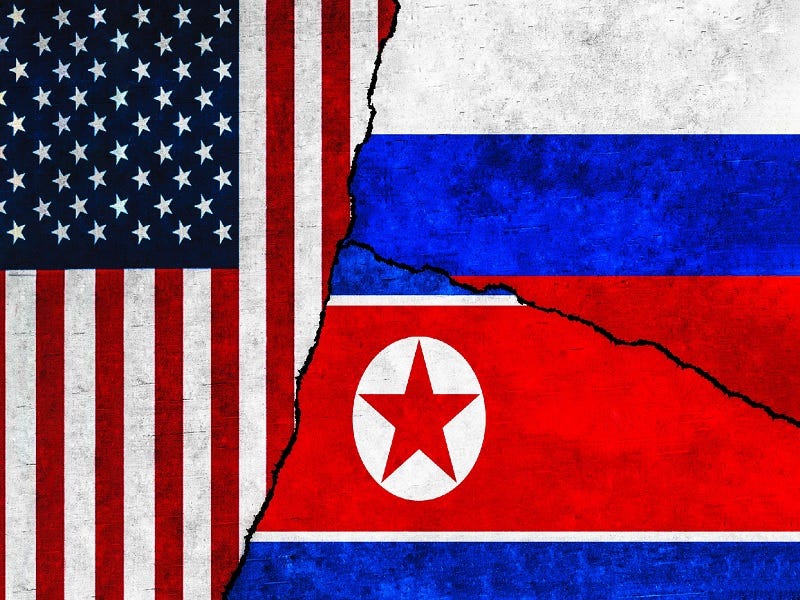The Kremlin wants to fulfill its allied commitments to North Korea and highlight its relevance in that part of Eurasia, both goals of which are driven by security, diplomatic, and soft power motives.
Russian Deputy Foreign Minister Sergey Ryabkov said in response to a question about his country’s possible missile deployment to the Asia-Pacific that this “will depend on the deployment of corresponding US systems in any region of the world.” This came less than a week after Putin authorized the use of Russia’s previously secret hypersonic medium-range Oreshnik missile in Ukraine, the strategic significance of which was analyzed here, and parallels newly deteriorating Russian-South Korean ties.
Seoul is considering arming Ukraine in response to unsubstantiated reports about Russia’s use of North Korean troops against that former Soviet Republic, which prompted Russian Deputy Foreign Minister Andrey Rudenko to warn that “we will respond in every way that we find necessary. It is unlikely that this will strengthen the security of the Republic of Korea itself.” The two triggers for Russia’s possible missile deployment to the Asia-Pacific are therefore the US doing so first or Seoul arming Kiev.
It's important to point out that while China is Russia’s close military partner and Moscow believes that Washington is engaged in what Russian officials describe as a “dual containment” strategy against both, Beijing isn’t its military ally, unlike Pyongyang with which Moscow just recently signed a military pact. That document was analyzed here and amounts to updating a Soviet-era one. Its strategic significance is that each pledged to help the other if they come under aggression and such assistance is requested.
Accordingly, Russia’s possible missile deployment to the Asia-Pacific would be in defense of its own and North Korea’s security, with the first immediate consequence being that it could inadvertently worsen China’s by serving to justify and accelerate the US’ regional containment plans against it. To explain, Trump plans to “Pivot (back) to Asia” upon the end of the Ukrainian Conflict, whenever that might be and regardless of the terms agreed to, which is already troubling enough from China’s perspective.
To make it even worse, Trump is inheriting the Biden Administration’s achievement of having brokered the improvement of South Korean-Japanese ties to such an extent that the US’ long-hoped-for regional trilateral is finally on the brink of becoming a strategic reality. The deployment of short- and intermediate-range Russian missiles to the Asia-Pacific, especially the state-of-the-art Oreshnik, would naturally justify the aforesaid and accelerate all three’s convergence into a tighter triangle.
On the diplomatic front, these missiles could always be withdrawn pending a grand deal between Russia, the US, North Korea, and possibly also China, though the latter’s involvement shouldn’t be taken for granted. After all, an agreement could be reached between the first three in exchange for de-escalating tensions in Northeast Asia, which could then free up the US and Japan to concentrate on more muscularly containing China in Southeast Asia via Taiwan and the Philippines, which both are close with.
It's premature to predict that this is exactly what will unfold, but the point is that Russia’s role in the emerging Asian front of the New Cold War could be leveraged for de-escalation purposes if its and North Korea’s security interests are met, which only requires negotiating with the US and not with China. Given these military-strategic dynamics, it’s possible that Trump might try to fulfill his campaign pledge to “un-unite” Russia and China by playing them off against each other, though that’s very unlikely to succeed.
All told, Russia’s possible missile deployment to the Asia-Pacific would be triggered by the US or South Korea, with the consequences being that it’ll solidify Russia’s role in that emerging front of the New Cold War while inadvertently worsening China’s security by justifying and accelerating the US’ “Pivot (back) to Asia”. The Kremlin wants to fulfill its allied commitments to North Korea and highlight its relevance in that part of Eurasia, both goals of which are driven by security, diplomatic, and soft power motives.





In as much as the US has genuine concerns about the possible deployment of Russian missiles in North Korea - especially missiles of Oreshnik’s ilk - it has a far greater concern that Moscow might deploy such missiles in Iran. Or sell them to Teheran. (If it hasn’t already done either of these things). Putin’s statement certainly allows for one or other of these possibilities
To the extent that the US and UK have not as yet doubled down on the number of missile strikes into Russia - I stress as yet - one has to suspect that the first item on the agenda of the (imminent) NATO emergency meeting will be the possibility that Iran now has Oreshniks, or might soon acquire them. If they do, North Korea might only feature last on that agenda.
‘Game changer’ at last has substantive meaning.
Bro. NATO/ EU + japan+ s.korea+ Australia is relentless. No chance of US offering peace ever in europe or middle East or east/ north asia.
Stalin wanted peace but US+FR+UK dishes out cold war .same with korea,Taiwan and vietnam .